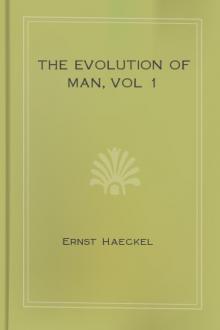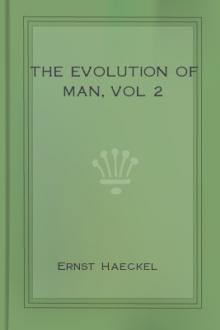Freedom in Science and Teaching. - Ernst Haeckel (mobi reader txt) 📗

- Author: Ernst Haeckel
- Performer: -
Book online «Freedom in Science and Teaching. - Ernst Haeckel (mobi reader txt) 📗». Author Ernst Haeckel
Personally, it was in the highest degree repugnant to me to come forward as the opponent of a man whom I learned, a quarter of a century ago, to acknowledge and to honour as the reformer of medical science; a man whose most ardent disciple and most enthusiastic follower I at that time was, with whom I subsequently stood in the closest relation as his assistant, and with whom I long after continued in the most friendly intercourse. The more keenly I lamented Virchow's position, for some years past, as the antagonist of our modern doctrine of evolution, and the more I felt myself challenged to a reply by his repeated attacks upon it, the less inclination I felt, nevertheless, to come forward publicly as the opponent of this distinguished and highly-honoured man.
And if I find myself, after all, forced to reply, it is in the persuasion that a longer silence will add to the erroneous conclusions which my hitherto resigned attitude has already given rise to; at the same time I believe that, precisely by reason of the peculiar interest with which I have throughout followed Virchow's scientific achievements, I am specially qualified to answer the question, a hundred times repeated by letter or by word of mouth—"How is it possible that a man who so long stood at the head of a party of progress in science as in politics, who in political life indeed, has outwardly maintained this position, has in science become an instrument of the most perilous reaction?"
A verbal answer, which I incidentally gave in March of last year at the Concordia Banquet at Vienna, was reported in the daily papers in such a different sense, and was in part so misunderstood or so intentionally misrepresented, that I am forced at last, on that account, to publish a clear and unambiguous reply. The "Augsburger Allgemeine Zeitung," which eagerly seizes every opportunity of expressing its unconquerable aversion to the evolution theory, accused me, in one of its hostile articles, of a virulent and undignified attack on Virchow. In contradiction of this misrepresentation in the Augsburg paper—which was copied by other journals—I must expressly assert that not Virchow but I myself am the person attacked, and that, therefore, the matter in question is not an unjustifiable attack by me on a formerly revered friend, but a defence to which I am compelled by repeated and sharp attacks on his part.
Another reason which urges me at last to break silence consists in the continual and ample advantage that all the clerical and reactionary organs have been taking of Virchow's address, during the last three-quarters of a year, in favour of mental retrogression. The shouts of triumph with which they at once hailed Virchow's "grand moral action," that is to say, his perversion from a Free-thinker to the side of mental darkness, was the first signal for that persistent utilisation of his authority of which the pernicious consequences can by no means be escaped. Friedrich von Hellwald, in his discussion on the speeches made at Munich, has already strikingly pointed out[6] the grave danger that exists when just such an one as Virchow, standing under the banner of political liberalism and wrapped in the mantle of severe science, decisively combats against the freedom of science and of its doctrines. This serious danger has never shown so threatening an aspect as at the present moment, when our political and religious life appears to be encountering such a reaction as has not occurred for a long time. The two insane attempts which, within a few weeks, have been made by Social-democracy against the revered and reverend person of the German Emperor have raised a storm of righteous indignation of such violence that calm judgment is entirely overthrown, and that many even of the most liberal of liberal politicians not only impetuously urge us to the severest measures against the Utopian doctrines of social democracy but, far over-shooting the mark, demand that free-doctrine and free-thought, that freedom of the press and even freedom of conscience shall be thrown into the narrowest fetters. Can this reaction, lurking in the background, find any more welcome support than is afforded by the mere demand of such a man as Virchow for restriction of liberty in teaching? And if he makes our present doctrines of evolution in general and the theory of descent in particular responsible for the mad doctrines of social-democracy, it is but a natural and just consequence when the famous New-Prussian "Kreuz-Zeitung" throws all the blame of these treasonable attempts of the democrats Hödel and Nobiling—as in fact it quite lately did—directly on the theory of descent, and especially on the hated doctrine of the "descent of man from apes." And the danger which threatens us shows a still graver aspect when we consider how great an influence Virchow has at the present day as an advanced liberal, and how he is regarded in the Prussian diet as the highest practical authority, and at the same time as the most liberal critic when educational questions are under consideration. Now it is well known that one of the most important problems lying before the Prussian parliament is the consideration of a new education-law, which will probably exercise its restricting influence for a long time to come, not in Prussia only, but throughout Germany; what can we expect of such an education-law if in the course of the deliberations, among the small number of those specialists who are generally listened to, Virchow raises his voice as a leading authority, and brings forward the principles that he proclaimed in his speech at Munich as the surest guarantees for the freedom of science in the modern polity? Article XX. of the Prussian Charter, and § 152 of the Code of the German Empire, say, "Science and its doctrines are free." And Virchow's first step, according to the principles he now declares, must be a motion to abrogate this paragraph.
In the face of this imminent danger, I dare no longer hesitate about my answer. Amicus Socrates, amicus Plato, magis amica Veritas. An unreserved and public opposition can be no longer postponed. As a matter of fact, at the Munich meeting, neither did Virchow hear my speech nor I his. I read my paper, as it is printed, on the 18th September 1877, and left on the 19th. Virchow came to Munich only on the 20th, and delivered his speech on the 22d.
Bearing in mind the gratitude which I owe to Virchow as my former master and friend at Würzburg—a gratitude which I have at all times striven to prove by the further development of his mechanical theory—I shall confine myself, as far as possible, to an objective and special confutation of his assertions. Certainly the temptation on this occasion was a strong one to pay the debt in like kind. In my Munich lecture, among the few names to which I alluded, I particularly mentioned that of Virchow as the distinguished founder of cellular-pathology (p. 12).[7] Virchow's return for this was to heap scorn and ridicule on the doctrine of evolution in his usual manner. The critic in the "National-Zeitung," Herr Isidor Kastan, says of this with particular satisfaction, "The ridicule with which Herr Virchow treated this side of Haeckel's visions was indeed caustic enough, but this is ever Virchow's way; only in this case, if in any, he was fully justified."
I could less easily ignore Virchow's denunciation of me than his satire—a denunciation which gibbeted me as a confederate in the social-democratic cause, and which made the theory of descent answerable for the horrors of the Paris Commune. The opinion is now widely spread that by this intentional connection of the theory of descent with Social Democracy he has hit the hardest blow at that theory, and that he aimed at nothing less than the removal of all "Darwinists" from their academic chairs and professorships. This is the inevitable consequence of his demands; for if Virchow insists with the utmost determination that the theory of descent must not be taught (because he does not regard it as true), what is to become of the supporters of that theory who, like myself, regard it as incontrovertibly true, and teach it as a perfectly sound theory? And at least nine-tenths of all the teachers of zoology and botany in Europe are among its supporters from immutable conviction of its truth, as well as all morphologists without exception. Virchow cannot expect that these teachers should collectively renounce that which they believe to be immutable truth, and in its place set up the dogma of the Church as the basis of their teaching, in accordance with his wish! Nothing remains for them but to vacate their professors' chairs, and—according to Virchow and the "Germania"—the "Modern Polity" would be in duty bound to deprive them of their liberty of teaching if they did not voluntarily renounce it.
If this be indeed Virchow's purpose, as it is generally supposed to be, with regard to me, at least, he may spare himself the trouble. Amongst us in Jena quite other ideas prevail as to the "Freedom of science in the modern Polity" than those which obtain in the capital, Berlin. And among us the Berlin students' rhyme has no meaning,
"Who knows the truth and freely speaks,
On him the law its vengeance wreaks."[8]
The Jena students, on the contrary, sing the rhyme in its original form—
"Who knows the truth and speaks it not,
A feeble wretch is he, God wot."[9]
The Rector Magnificentissimus of the University of Jena, the Grand Duke of Saxony, who has proved himself the protector of the arts and sciences, has besides far more liberal views as to the liberty of scientific investigation and teaching than the illustrious head of the party of progress at Berlin. The enlightened and liberal Prince at Weimar, under whose particular protection we in Jena find ourselves, has never conceived it necessary to limit in any way the unbounded freedom of my teaching and my writing; not even when in 1866 my "General Morphology," and 1868 my "History of Creation" first appeared, and when many people attempted to make the youthful extravagances which were to be found in those works the ground of a serious accusation. And what farther mischief have these extravagances done, though I now sincerely lament them?
Faithful to the glorious traditions of a past extending over three centuries, the little Thuringian university of Jena will find a way to preserve her perfect and unlimited freedom. She will ever bear in mind that she is the first Protestant university of Germany, protesting against every strait-waistcoat which hierarchical obstinacy would force upon human reason, against every dogma by which the arrogance of the learned may try to suppress all freedom of teaching. She will freely seek and freely teach in accordance with her highest convictions, untroubled by the fact that in the "great" university of Berlin nothing may be taught, as Virchow insists, but what is objectively ascertained, absolutely sure; that is to say, nothing that rises above individual, indubitable, and intelligible facts; not an idea, not a conception, not a theory, in fact not any real science; mathematics, at most, excepted. It is our conviction that Jena will continue to be an independent city of refuge for free science and free teaching as long as it remains under the faithful nurture and liberal protection of the princely house of Sax Weimar, that enlightened race which is linked with the history of German intellect through the matchless traditions of its glorious past. What the Wartburg was to Martin Luther, what Weimar has been to the foremost heroes of German literature, what Jena





Comments (0)